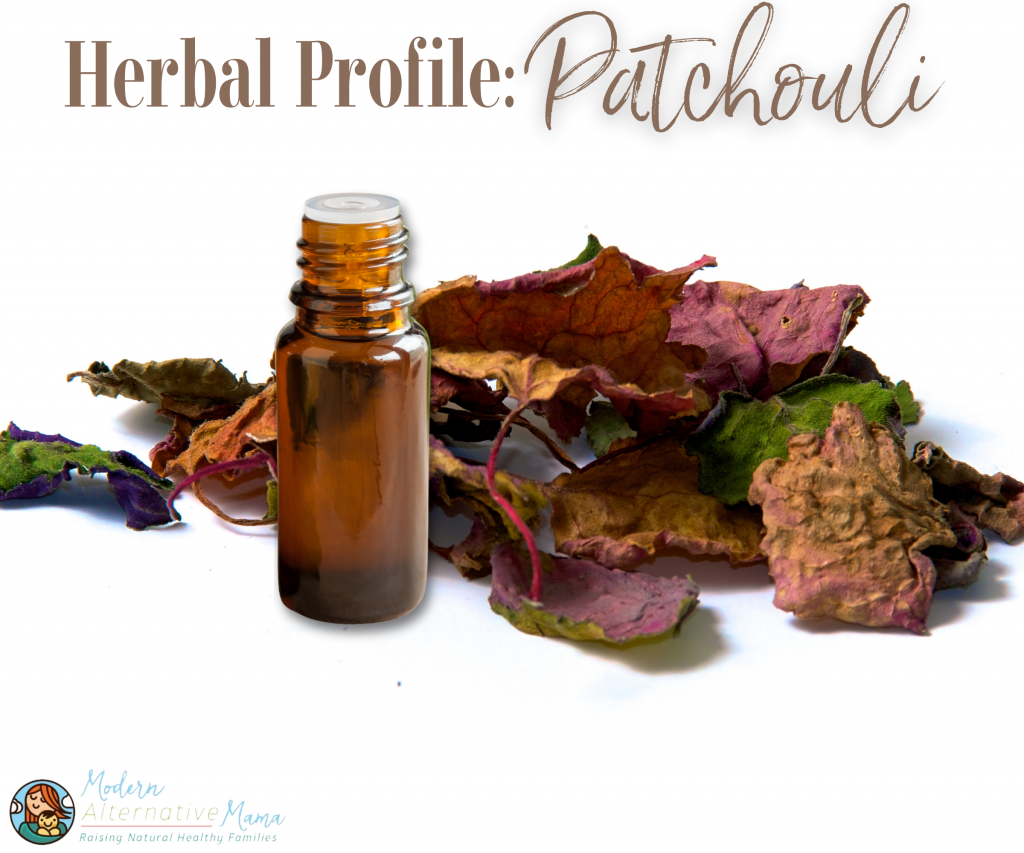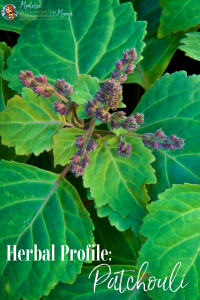What is Patchouli
The patchouli plant, sometimes called Pogostemon cablin, its botanical name is a perennial shrub from the mint (Lamiaceae) family. Patchouli grows to about 3 feet tall and can be identified by its large, irregularly toothed, oval-shaped, fragrant leaves. The leaves grow oppositely along branching stems, and both the stems and the leaves are densely hairy. The patchouli plant blooms small pale purple to white flowers arranged in dense woolly spikes (1).
Health Benefits of Patchouli
Medicinally speaking, patchouli leaves are crushed, and the oil is rubbed on the skin for its many health benefits. The oil from the leaves can also be turned into an essential oil. Some of patchouli’s health benefits include:
Antibacterial Properties
An antibacterial property is when a substance, or in this case, an herb, can destroy or suppress the growth and reproduction of bacteria (2). One study found patchouli oil disrupted biofilms and the severity of methicillin-resistant Staphylococcus aureus (MRSA) strains (3). Another study analyzed a blend of essential oils, including patchouli, and found it inhibited the growths of several bacteria like Pseudomonas aeruginosa, Staphylococcus aureus, and Streptococcus pneumoniae. The study also demonstrated patchouli oil alone inhibited the growth of some bacteria equally or better than the essential oil blend (4).
Antifungal Properties
An antifungal property is when a substance, or in this case, an herb, can fight the growth of specific pathogens that could harm your health, such as ringworm, athlete’s foot, tinea versicolor, toenail fungus, and jock itch (5). One study analyzed 60 essential oils for antifungal properties and found patchouli oil had substantial antifungal activity against Cryptococcus neoformans (6).
Anti-Inflammatory Properties
Several studies have demonstrated patchouli’s anti-inflammatory properties. Chronic inflammation has been linked with many diseases, such as type 2 diabetes, asthma, and certain cancers (7). In animal studies, patchouli oil decreased chemically-induced swelling (edema) in the paws and ears of mice (8). In other studies, patchouli oil reduced the migration of immune cells associated with inflammation by lowering the levels of molecules produced by cells when stimulated in vivo and in vitro (9,10). Additionally, when treated with patchouli oil, rats with chemically-induced inflammatory bowel disease had less damage and immune cell accumulation in their colon (11).
Pain-Relieving Properties
As of 2016, an estimated 20.4% of U.S. adults (50.0 million) had chronic pain, and 8.0% of U.S. adults (19.6 million) had high-impact chronic pain (12). One animal study found oral patchouli extract reduced pain responses in several tests done on mice, likely due to its anti-inflammatory properties (13).
May Promote Skin Health
Statistics say one in three Americans will struggle with skin conditions (14). Patchouli oil may be the key to some of these issues. An animal study found using patchouli oil protected against ultraviolet radiation exposure. The results showed less wrinkle formation and increased collagen content (15).
Insecticidal Properties
An insecticidal property is when a substance, or in this case, an herb, can kill, harm, repel or mitigate one or more species of insects (16). One study analyzed several essential oils and found patchouli oil was most effective at killing house flies (17). Another study found patchouli oil demonstrated insecticidal properties in several ant species (18). Additionally, patchouli oil had similar effects on two species of mosquitoes (19).
Safety Concerns
Mainstream sources claim there isn’t enough information to know if patchouli oil is safe when applied to the skin or what the side effects might be. They also caution against its use when pregnant and breastfeeding, claiming there isn’t enough reliable information to know if patchouli oil is safe during those life stages (20).
Contrarily trusted aromatherapist Wendy Robbins says otherwise. Aside from her normal precaution to never use any essential oils internally or undiluted, she warns that patchouli essential oil may inhibit blood clotting and pose a drug interaction hazard (21).
How to Use Patchouli
Citronella is most often used in the form of essential oil. I recommend Plant Therapy’s Citronella Essential Oil, which is safe for pregnancy, breastfeeding, kids, dogs, and horses. If you’re a DIY person, some great starter recipes are:
Follow the recommendations of any supplement; some of my recommendations include:
- Earthley’s Mineral Deodorant (Rustic) is a 100% natural deodorant that actually works! With absolutely no aluminum, baking soda, or artificial ingredients of any kind, you can be confident our Mineral Deodorant is safe and beneficial to your health. We use natural magnesium chloride to detox your pits, arrowroot powder to keep you dry, and plant-based oils to gently nourish your sensitive underarm skin.
- Earthley’s Pest Aside is the natural and effective way to prevent bug bites! Our essential oil blend repels bugs to ward off those itchy, annoying bites so you can enjoy the great outdoors. This salve comes in a convenient tube, so it’s perfect for taking on the go for a mess-free application.
- Earthley’s Rustic Essential Oil Blend is designed to delightfully refresh your space. This rustic-like scent combines the freshness of bergamot with the intensity of frankincense, along with uplifting notes of coriander and patchouli. This blend of refreshing, relaxing oils makes your home smell clean and calm.
- Earthley’s Tame the Beard Oil (Rustic) settles down unruly beards with lightweight moisture. It conditions the skin and hair to leave it well-groomed and smelling great. Available in Unscented or Rustic.
- Plant Therapy’s Organic Patchouli Essential Oil is steam distilled from the leaves of the patchouli plant to produce a high-quality essential oil that’s USDA Certified Organic with absolutely no additives or fillers.
- Plant Therapy’s Patchouli Essential Oil is steam distilled from the leaves of the patchouli plant to produce a high-quality essential oil.







